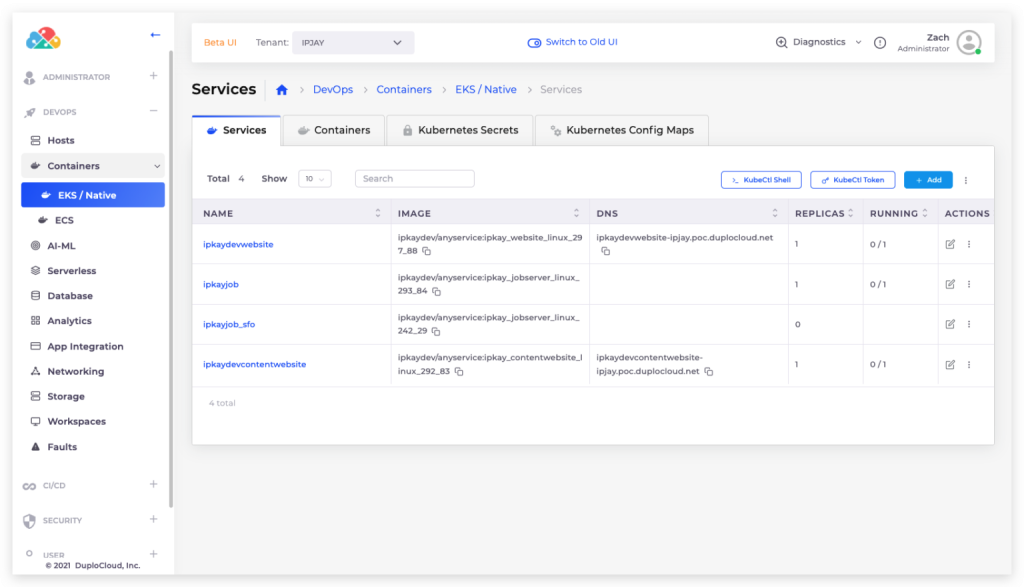Switching to a cloud solution can help healthcare providers streamline their business. Here are the best options.
There are numerous advantages to switching from on-premises to cloud computing solutions, from lowering overhead costs to increasing operational efficiency. In today’s healthcare landscape, providers have a suite of cloud solutions to choose from, but determining which best suits a given organization requires some careful analysis. Here’s how your organization can best gauge which cloud solution for healthcare meets your specific needs.
Why Choosing Low-Code Is the Right Move
Learn more about the rules, regulations, risks, and benefits of healthcare cloud computing with Cloud Computing in Healthcare: A Comprehensive Guide.
Benefits of Migrating to the Cloud
Using a cloud solution for healthcare will create a more reliable, consistent service for clients and employees. Additionally, cloud services can lower operating costs, dramatically reducing the required headcount for an IT division because systems are automatically updated and maintained. The median annual salary of an IT professional in the US is $97,430, so healthcare organizations stand to save a significant amount just on labor by making the transition.
Additionally, cloud storage in healthcare environments further reduces operational costs, as organizations won’t have to pay to maintain on premises servers. This allows healthcare organizations to operate out of a smaller, less expensive space, or use the additional room for other operations.
Cloud solutions provide easy access to software-as-a-service (SaaS) applications that streamline the patient and provider experience. The additional computing power has helped to further Big Data Analytics within the healthcare industry, allowing care providers to find new patterns in patient records and create better predictive care models.
When making the transition, organizations will want to be mindful of the differences between cloud migration services and cloud providers, both of which are instrumental in establishing secure, compliant cloud operations. Cloud migration services will move your data and applications to cloud environments at a faster pace than an internal DevSecOps team could. Cloud providers will host all of the information and applications when the transition is complete.
For a more in-depth examination of the benefits of migrating to the cloud, read our blog post “What Is Cloud Computing in Healthcare?”
Ensuring Compliance and Security During Cloud Migration
Healthcare providers need to ensure that they’re meeting PCI and HIPAA compliance guidelines while they migrate to cloud environments, as failing to do so can result in hefty fines. In fact, data breaches — a common cause of HIPAA violations — can cost millions of dollars. A 2020 IBM study found that the average cost of a healthcare data breach is $7.1 million — 10% higher than it was in 2019. Humans are largely to blame. Verizon’s 2022 Data Breach Investigation Report found that 82% of data breaches involve a human element, making it the most common cause. To mitigate security risks while transitioning to a cloud environment, remove the human element.
DevSecOps automation platforms can reduce the time and cost of migrating from on-premises to healthcare cloud storage and cloud computing solutions. Automation platforms will often have compliance features for PCI and HIPAA baked in, ensuring that the guidelines are met without risking security breaches that stem from human error during development. This dramatically reduces the risk of a data breach affecting your organization.
Want to see how experienced healthcare professionals are ensuring compliance in their cloud? We surveyed 500 IT specialists working in healthcare to get their thoughts on the benefits and ease of transition to the cloud. For a complete breakdown, get the full report.

The Best Cloud Solutions for Healthcare
Whether you need a service to assist your transition to a cloud environment or a cloud provider, here are the best cloud solutions for healthcare on the market. Do note that these platforms all ensure compliance with HIPAA guidelines:
DuploCloud

by DuploCloud, Inc.
Website: duplocloud.com
DuploCloud’s DevSecOps automation services ensure that HIPAA and PCI compliance protocols are being met as you transition from on-premises to cloud healthcare services. The platform builds and operates a fully compliant infrastructure on your behalf based on the standard of your choice. As a low-code solution, it offers a robust toolset to help your software team at every step of the development pipeline, shortening the amount of time that it takes to finish the transition considerably. If you’re looking to move your on-premises operations to the cloud, DuploCloud will get you there.
Amazon Web Services
by Amazon, Inc
Website: aws.amazon.com/health
Amazon Web Services (AWS) for Healthcare offers a holistic solution for healthcare cloud computing. The service delivers a robust suite of data management tools, which also enable facilities to pursue life sciences and genomic application solutions in addition to client-facing healthcare work. The platform has been trusted by industry leaders like Moderna for day-to-day operations thanks to its ubiquity.
Microsoft Azure
by Microsoft, Inc
Website: azure.microsoft.com/en-us/solutions/industries/healthcare/
Microsoft Azure’s cloud services are built around continuous patient monitoring, which helps improve patient outcomes and streamline clinical operations. The platform’s continuous patient monitoring services can integrate with IoT technology, which equips facilities with the tools necessary to deliver smart healthcare equipment to their patients. That healthcare equipment can even go so far as to create an entire smart hospital building, which enables way-finding services, smart contact with service providers (i.e. patients automatically connecting with a cardiologist if they’re experiencing heart palpatations), and remote check-in services. Finaly, Azure features AI and machine learning techniques that can help develop personalized preventative care plans.
Google Cloud Computing
By Alphabet Inc
Website: cloud.google.com/solutions/healthcare-life-sciences
Google Cloud Computing’s healthcare tools scale advanced research operations and empower care providers with a robust set of collaboration and productivity tools. The end goal is to equip healthcare providers with the capability to ensure broad population health. Google Cloud’s tools accomplish its mission by enabling telehealth appointments, enabling remote work, and providing easy access to healthcare applications. Google cloud equips frontline workers with additional resources as well, fitting them with secure Chrome and Android devices.
IBM Cloud
By: International Business Machines Corporation
Website: ibm.com/cloud/healthcare
IBM’s main selling point for its cloud services is Merative, previously known as Watson Health, an AI that’s helping to revolutionize patient care. Merative is a leading data and analytics AI made to help providers modernize their operations. It offers specialized healthcare consulting services that improve both business and clinical experience. Outside of Merative, IBM’s cloud platform focuses on leveraging data from both internal and external sources to provide business insights. IBM’s business improvements are derived from the more efficient systems and applications it enables businesses to use, doing away with the fragmentation that’s found in many traditional healthcare applications.
Why Low-Code DevOps Is the Right Move for Your Cloud Migration
Facilitating the move to a cloud solution at a substantially lower cost and more rapid pace than traditional development, low-code DevSecOps is an obvious choice for healthcare organizations looking to make the transition as quickly and smoothly as possible. With the tools to connect with leading cloud service providers while ensuring healthcare cloud storage remains secure, DuploCloud’s service offering brings value to the table. Contact us today to learn more.









